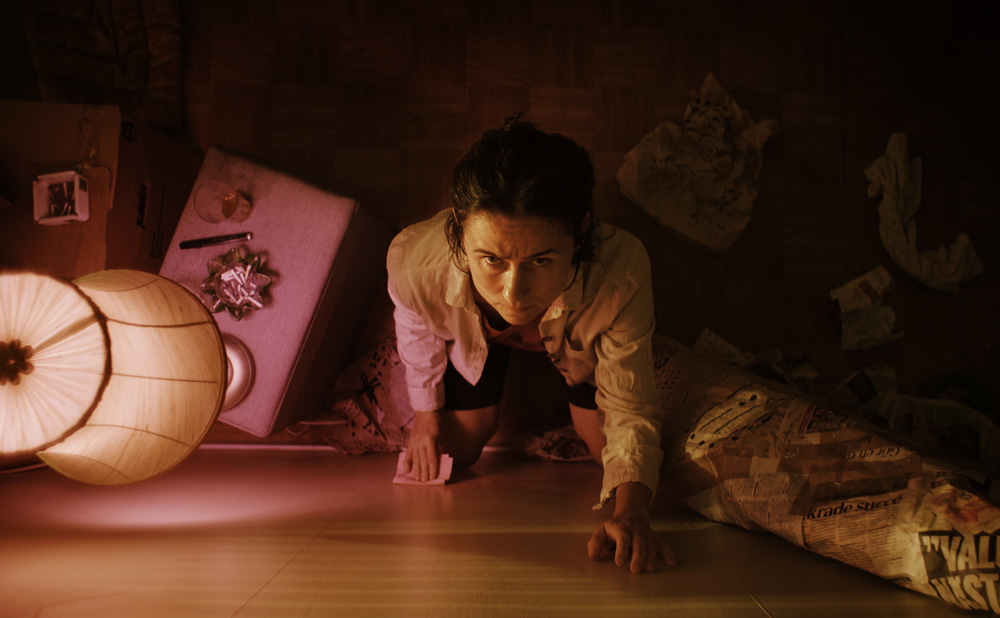Molly (Cecilia Milocco) should know what she’s in for when stepping inside the elevator to take her to her new apartment in “Knocking,” with “HELP” scrawled out in red spray paint on one of its walls. Just released back into the public after spending time at a psychiatric clinic, she’s a little fragile these days and wants to assume she’s in a safer space, though anyone in which she’s left with her own thoughts can be dangerous. With no air conditioning, she finds it hard to sleep, though you suspect that isn’t the issue keeping her awake at night and the perpetual pounding that she hears from the apartment above – or is it next door? Or just below her? – ensures there will be no shut-eye in her future. Yet it is Molly’s past that mostly roils around her head, thinking back to when she last sat beachside with her late partner Judith, tinting everything she sees in the present with a bit of sadness as well as a suspicion of evil.
You ultimately can’t trust your eyes in “Knocking” when you know you’re seeing the world through Molly’s, yet Frida Kempff’s chilling psychological thriller so meticulously conjures the world as she experiences it, full of memories she finds comfort in and growing concerns about the others in her apartment building based only off of what she can hear through the walls, that you wonder how that view has been shaped by others subconsciously as she searches for someone to trust her and the repeated denials lead her to burrow into her own head. Holding onto her reality so tightly even as others try to peel it back for her, Molly is given vivid life through a fearless performance from Milocco, showing in drips and drabs how Molly is frightened of what her mind may be capable of, and Kempff shows major muscle in her narrative feature debut, tethering the camera to Molly and making the humble world around her seem larger-than-life spatially and in its bold, haunted colors.
On the eve of the film’s premiere in the Sundance Film Festival’s Midnight section, the director and star of “Knocking” spoke of creating such a compelling character study where it involved so much isolation on set and the creative way of charting the film’s emotional beats before going into production.
How did this come about?
Frida Kempff: I have a history in documentary, so I started there because I wanted to deal with topics of today, social issues and stories that matter, but I always [felt] there was a freedom that I couldn’t have in documentary because it’s real people. It’s real life. And when I came across this novel called “Knocks,” I realized that I can combine the story that matters into a genre movie. Even though this is such a small story, it’s still very big and universal, so that got me started. It also [appealed to] me as a filmmaker with [only] a few locations, mostly just an apartment, and working with the sound as [part of] a story as well was interesting.
The two of you go back to Frida’s short “Dear Kid” – was Cecilia in mind from the start?
Cecilia Milocco: No, I got into the project after the script was [written], but I really wanted to [do it]. This novel is about a woman who is a lot older, so I understood that she had found another interpretation of this woman…
Frida Kempff: Yeah, in the novel Molly is actually much older, around 70, so I auditioned a lot of elder woman actress in Sweden and I always had in my back of my head that, “Shit, I really want to work with Cecilia again. I wish she was older.” After a while I didn’t find anyone that would suit Molly, so I figured out that I could actually make Molly younger because in a way this could add something to the story, [in terms of] getting out and getting a new life, so I called her. I had that gut feeling that I knew she was going to do this brilliantly, so why pick someone else?
Cecilia, was there anything you could connect with to figure this out?
Cecilia Milocco: This film is really in her mind – you are participating in Molly’s mind, and I liked her mind when I read the script. She’s very sensitive, and in her loneliness, she’s experiencing things in another way and that inner world attracted me. Also, of course, she’s in this grief, but she wants to start over so she’s trying to put her two feet on the ground again and it’s slipping away all the time.
Frida, you’ve had a long-held interest in memory. Was it a challenge to structure the script in such a way that the past would be interacting with the present and figuring out how to make that fluid?
Frida Kempff: Yeah, when I start an idea, I always start with the character’s mind. Who is this person and how does she react on things? And I have this passion about how we work in our inner world, so everything was built the way I wanted it to be in the editing. That was when we really knew how to work with her trauma and her flashbacks. And some of the flashbacks are actually just a camera pointing at some direction after [we had called “cut” on a scene]. Hannes [Krantz, the cinematographer] was very good about filming when we were not supposed to film, so I had this material with Molly and her lover Judith walking on the beach [which was] just something that he was filming when we was in transport between two sets.
Were the scenes at the beach actually actually shot before the present day at the apartment?
Frida Kempff: Yeah, we did actually do that first. I was so afraid of the weather because in Sweden we don’t have a lot of sunshine, and we were filming in October. I saw we were going to go into a rainy period during the shooting schedule, so we did that a couple of weeks before the real shooting, and I think that was good for Cecilia to have that going into the [main] story.
I loved the relationship that the camera had to the character, and obviously the lighting is extraordinary. As an actress, was that actually something you could use as an expression of the character?
Cecilia Milocco: Yeah, it all was very specific and that became this beautiful mix of presence and technique in the scenes and I had a lot of fun with that. Then I also have to mention Hannes the cinematographer. He was very good at [feeling like] he wasn’t there with his camera. He was in my face in a scene, or between my legs, and he did not [feel like he] was there. It was very beautiful work he did.
Frida Kempff: I came up with a color schedule [for the story] that was for Cecilia and for the cinematographer as well. We started with green, which was the most healthy, steady camera, and then there were [all] these colors [in between] and in the end, it was really red, so that was a good way of communicate with both of them. The camera was always following Cecilia’s performance and we started more long shots, getting closer and closer to her during the emotional journey, and I think Cecilia got more and more used to it. In a way Cecilia, I think that the camera was your supporting actor.
Cecilia Milocco: Yes, it was an invisible supporting actor. [Hannes] did that very good, and with this color system, we had a language together so we could find ourselves and there wasn’t a lot of discussion of, “Yeah, but she feels like this now.” It was like we went with that equalizer [of the color system] that Frida invented before shooting, so that was really good.
Frida Kempff: I was trying to actually have that on every department, so [for instance] the costume [department] would also be working [towards] that. We didn’t have so much time, but if you re-watch it, before Molly gets up and go into this apartment, she has this white pinkish color on her shirt, and then a second later it’s red, so it would reflect her temperament in the clothes.
You mentioned earlier building the soundscape of this. Did you have pretty firm ideas in mind beforehand of what this would sound like, or was that an evolving process throughout?
Frida Kempff: I’ve been working with [the same] sound designer on my previous work, so I knew that he doesn’t just put sound on the image. He creates this world and I was very pleased he accepted the job and we had prerecorded some sounds that we played on set so Cecilia could act to them.
Cecilia Milocco: Yeah, it’s always a hard thing to imagine things [like the knocking in the film], so it was very fun when sometimes I had these other actors that came. It was like, “Oh, I can actually speak in this film too.” [laughs] But it’s very nice to work like that. It’s like you’re building up a presence.
“Knocking” will be available on October 19th on iTunes and Vimeo on Demand.




